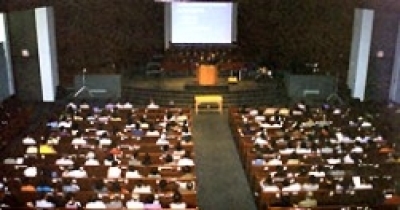Contrasts between the Churches in China
Contrasts: 1
A prosperous town in southeast China. Neat concrete and brick two- and three-story houses built by the local farmers are mirrored in the nearby paddy-fields. Towering over them on a hill is a huge church with a large cross on its massive cupola. What is this cathedral-like structure doing, looming incongruously over the Chinese countryside?

Here in Wenzhou, "the Jerusalem of China," there are many such churches, all built by the free-will donations of the local Christian farmers in recent years. Many seat over a thousand people and have marbled floors and galleries. In the whole area there are over 600,000 Protestant Christians - 10% of the total population. Hundreds of churches large and small dot the landscape, their red crosses a visible witness to the spread of the gospel.
Christianity is well-established and the church runs its own theological training schools and summer camps and can afford to send promising young people to officially-approved seminaries.
The situation is very different in the remote mountains of Guizhou province in the southwest. Here, the peasants - many of them minority Miao people - scratch a living from the stony soil. Tiny terraced fields are easily washed away in flash-floods racing down the sides of the mountains looming everywhere. Pigs and chickens roam in and out of courtyards and along the muddy trails which pass for roads. Many villages are without electricity, and water has to be hand-carried from wells. The local Christians are cheerful, but very poor. Some only earn the equivalent of US$10 per annum.
Theirs is a subsistence economy, with what little is left over from their own use in the way of crops or livestock sold for a pittance in the distant market-town. The church meets in a dilapidated thatched hut lit by oil-lamps or candles. The congregation sits on crude benches or squats on the floor. The weekly offering amounts to a few RMB and is nowhere near enough to support a pastor, let alone to send an aspiring young person to study for the ministry.
The contrast between the two areas is a sharp reminder that the church in China, like society at large, is by no means uniform. In some favoured coastal and urban areas it shares in and benefits from the rising standards of living. Prosperous peasants and an increasingly affluent middle-class are converted and use their new-found wealth for the glory of God and the extension of His kingdom. But in the rural hinterland and the remote minority lands of the far West millions of people live below the poverty line.
Now some churches in the more prosperous regions of China are being challenged to channel some of their economic wealth and their personnel to help their brothers and sisters struggling to maintain church work in conditions of direst poverty. There are also opportunities for overseas Christians to serve in such areas in providing basic health care and education. Whether God calls Chinese or overseas Christians, such service is not for the faint-hearted - living conditions are very basic, sanitation poor, and financial remuneration minimal or non-existent. Yet who can tell the spiritual rewards in sharing the love of Christ with the poor?
Contrasts: 2
In a modest apartment in a quiet corner of a university campus, a group of a dozen Chinese meet for Bible study and prayer. Yet this is no ordinary gathering. Nearly every member of the group is a professor or the wife of a professor. Some are retired and experienced the fierce heat of persecution in the fifties and sixties. All are living testimony to the remarkable work of God among Chinese intellectuals in recent years. In the same university a similar fellowship operates for young undergraduates who meet as a "salon" to discuss the relationship of Christianity to culture, literature and society. These fellowships meet privately by necessity, but are having an increasing influence among Chinese intellectuals and even Party members.
In the "open" churches, too, more and more well-educated intellectuals, both young and old, are to he seen. Some churches have special meetings for discussion, or weekly "youth" meetings (for the 18-30 year-old bracket) at which many students can be seen drinking in every word of the hour-long message or sharing their testimony.
But, in contrast, visit a large rural congregation in the depths of central China. Whether registered or unregistered it may attract several hundred people. If registered, it may be pastored by an elder or deacon without any formal training. A pastor from the nearest city church may come once or twice a year to conduct baptisms. If unregistered, it may be led by an elderly, experienced Christian or by an inexperienced teenage girl.
Whatever the case, the over-stretched leadership will be fortunate to have a Bible and a hymn-book - many of their flock will lack both. Moreover, a good percentage of the congregation may be illiterate, particularly if they are elderly women. In 1994 127 million women, or 32% of the total number of women in China over the age of fifteen, were still classified as functionally illiterate. Even of those classed as literate, the vast majority of young men and women in most rural areas receive only primary school education. This means that many house churches and meeting points are run by keen and enthusiastic, but woefully ill-educated young people.
Concerned Christians overseas need to see the church in China in all its diversity. As we pray and seek to become more involved, may we avoid stereotypes and appreciate our Chinese brothers and sisters in Christ as they seek to witness for Him in widely differing situations.
Contrasts: 3
Urban/Rural
Coastal/Hinterland
Open/Often closed (to tourists, etc.)
Han/Minority
Educated/(Semi-)illiterate
Affluent/Poor
Developing/Falling behind
Sophisticated/Traditional
Atheistic/Superstitious, Folk religion
Biblical /Cultic, heretical
(Note: Lest we be accused of perpetuating stereotypes ourselves, the above is only intended to give the broadest of brushstrokes, and there are many exceptions!)




























